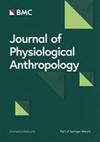Sleep and allergic diseases among young Chinese adults from the Singapore/Malaysia Cross-Sectional Genetic Epidemiology Study (SMCGES) cohort
IF 3.1
4区 医学
Q1 Social Sciences
引用次数: 0
Abstract
Sleep disruption has been shown to affect immune function and thus influence allergic disease manifestation. The specific effects of sleep on allergic diseases, however, are less well-established; hence, in a unique population of young Chinese adults, we investigated the association between sleep and allergic disease. Young Chinese adults recruited from Singapore in the Singapore/Malaysia Cross-Sectional Genetic Epidemiology Study (SMCGES) were analyzed. We used the International Study of Asthma and Allergies in Childhood (ISAAC) protocol and a skin prick test to determine atopic dermatitis (AD), allergic rhinitis (AR), and asthma status. Information regarding total sleep time (TST) and sleep quality (SQ) was also obtained. Of 1558 participants with a mean age of 25.0 years (SD = 7.6), 61.4% were female, and the mean total sleep time (TST) was 6.8 h (SD = 1.1). The proportions of AD, AR, and asthma were 24.5% (393/1542), 36.4% (987/1551), and 14.7% (227/1547), respectively. 59.8% (235/393) of AD cases suffered from AD-related sleep disturbances, 37.1% (209/564) of AR cases suffered from AR-related sleep disturbances, and 25.1% (57/227) of asthma cases suffered from asthma-related sleep disturbances. Only asthma cases showed a significantly lower mean TST than those without asthma (p = 0.015). Longer TST was significantly associated with lower odds of AR (OR = 0.905, 95% CI = 0.820–0.999) and asthma (OR = 0.852, 95% CI = 0.746–0.972). Linear regression analyses showed that lower TST was significantly associated with asthma (β = − 0.18, SE = 0.076, p-value = 0.017), and AR when adjusted for AR-related sleep disturbances (β = − 0.157, SE = 0.065, p-value = 0.016). Only sleep disturbances due to AR were significantly associated with a poorer SQ (OR = 1.962, 95% CI = 1.245–3.089). We found that sleep quality, but not sleep duration was significantly poorer among AD cases, although the exact direction of influence could not be determined. In consideration of the literature coupled with our findings, we posit that TST influences allergic rhinitis rather than vice versa. Finally, the association between TST and asthma is likely mediated by asthma-related sleep disturbances, since mean TST was significantly lower among those with nighttime asthma symptoms. Future studies could consider using objective sleep measurements coupled with differential expression analysis to investigate the pathophysiology of sleep and allergic diseases.新加坡/马来西亚横断面遗传流行病学研究(SMCGES)队列中华裔年轻人的睡眠与过敏性疾病
睡眠障碍已被证明会影响免疫功能,从而影响过敏性疾病的表现。然而,睡眠对过敏性疾病的具体影响尚未得到充分证实;因此,我们在一个独特的中国年轻成年人群体中调查了睡眠与过敏性疾病之间的关系。我们分析了新加坡/马来西亚横断面遗传流行病学研究(SMCGES)中从新加坡招募的中国年轻人。我们采用国际儿童哮喘和过敏研究(ISAAC)方案和皮肤点刺试验来确定特应性皮炎(AD)、过敏性鼻炎(AR)和哮喘状态。此外,还获得了有关总睡眠时间(TST)和睡眠质量(SQ)的信息。1558 名参与者的平均年龄为 25.0 岁(SD = 7.6),61.4% 为女性,平均总睡眠时间(TST)为 6.8 小时(SD = 1.1)。患有 AD、AR 和哮喘的比例分别为 24.5%(393/1542)、36.4%(987/1551)和 14.7%(227/1547)。59.8%(235/393)的注意力缺失症病例患有与注意力缺失症相关的睡眠障碍,37.1%(209/564)的注意力缺失症病例患有与注意力缺失症相关的睡眠障碍,25.1%(57/227)的哮喘病例患有与哮喘相关的睡眠障碍。只有哮喘患者的平均 TST 明显低于非哮喘患者(p = 0.015)。较长的 TST 与较低的 AR(OR = 0.905,95% CI = 0.820-0.999)和哮喘(OR = 0.852,95% CI = 0.746-0.972)几率明显相关。线性回归分析表明,较低的 TST 与哮喘(β = - 0.18,SE = 0.076,P 值 = 0.017)和 AR 显著相关,如果调整与 AR 相关的睡眠障碍(β = - 0.157,SE = 0.065,P 值 = 0.016)。只有 AR 导致的睡眠障碍与较差的 SQ 显著相关(OR = 1.962,95% CI = 1.245-3.089)。我们发现,在注意力缺失症患者中,睡眠质量明显较差,但睡眠时间却不长,尽管无法确定确切的影响方向。考虑到相关文献和我们的研究结果,我们认为 TST 会影响过敏性鼻炎,而不是相反。最后,TST 与哮喘之间的关联很可能是由哮喘相关的睡眠障碍介导的,因为在有夜间哮喘症状的人群中,平均 TST 明显较低。未来的研究可以考虑使用客观的睡眠测量方法和差异表达分析来研究睡眠和过敏性疾病的病理生理学。
本文章由计算机程序翻译,如有差异,请以英文原文为准。
求助全文
约1分钟内获得全文
求助全文
来源期刊

Journal of Physiological Anthropology
Social Sciences-Human Factors and Ergonomics
CiteScore
4.80
自引率
6.50%
发文量
39
审稿时长
>12 weeks
期刊介绍:
Journal of Physiological Anthropology (JPA) is an open access, peer-reviewed journal that publishes research on the physiological functions of modern mankind, with an emphasis on the physical and bio-cultural effects on human adaptability to the current environment.
The objective of JPA is to evaluate physiological adaptations to modern living environments, and to publish research from different scientific fields concerned with environmental impact on human life.
Topic areas include, but are not limited to:
environmental physiology
bio-cultural environment
living environment
epigenetic adaptation
development and growth
age and sex differences
nutrition and morphology
physical fitness and health
Journal of Physiological Anthropology is the official journal of the Japan Society of Physiological Anthropology.
 求助内容:
求助内容: 应助结果提醒方式:
应助结果提醒方式:


